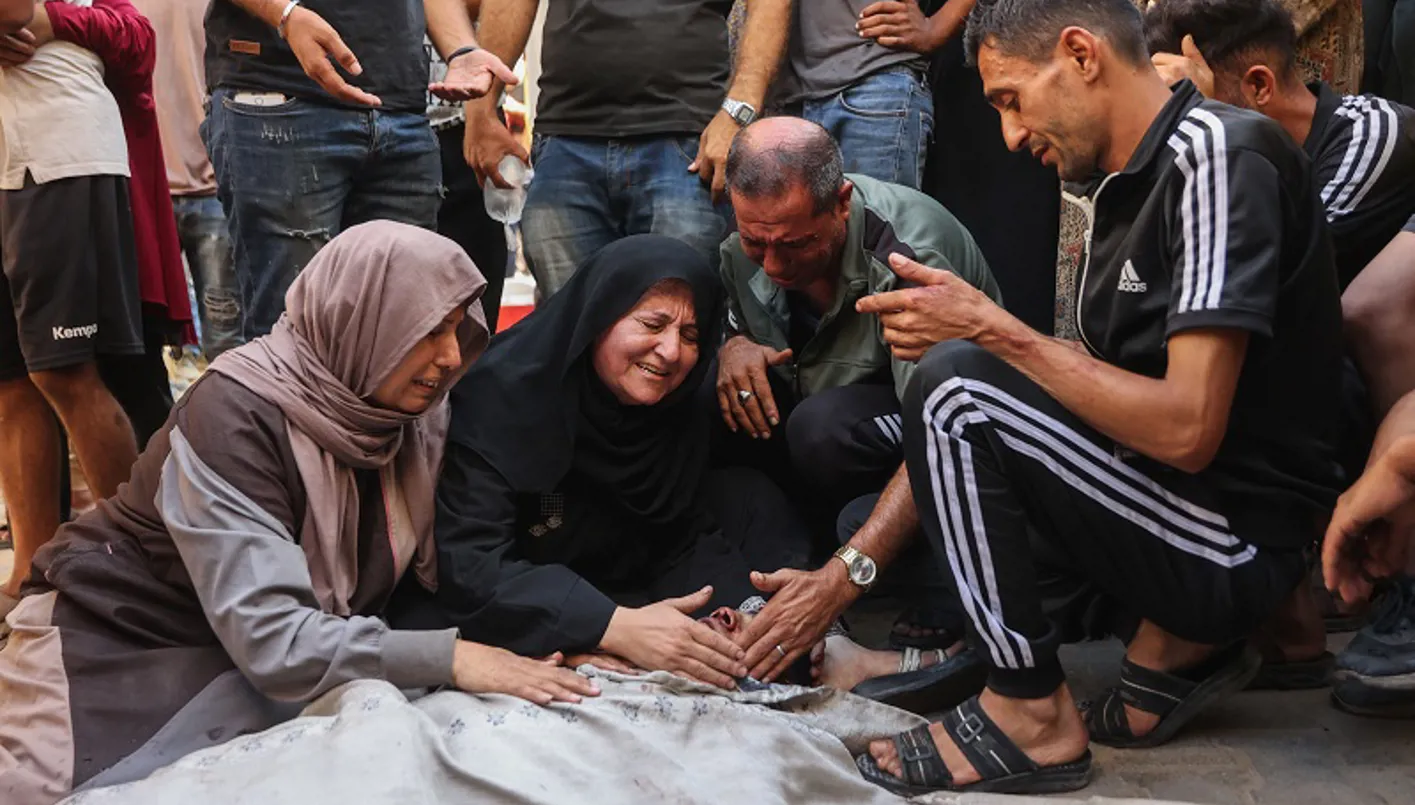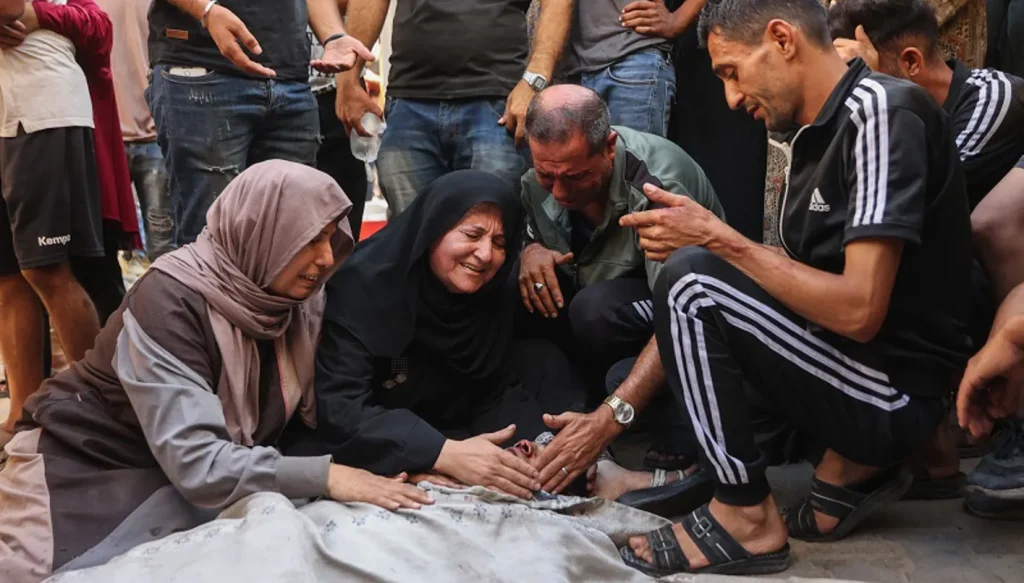Palestinians mourn the body of a relative killed in Israeli airstrikes on Gaza City, (AFP).
Israel insists on a comprehensive agreement with Hamas and threatens a large-scale military operation in Gaza City, despite the Palestinian movement’s acceptance of a temporary deal, reflecting an escalation that could prolong the war and complicate prospects for a solution.
Over the past year, Israel strongly insisted that ceasefire negotiations focus exclusively on a temporary agreement, postponing a more durable deal. However, even after Hamas recently announced its willingness to accept a temporary truce, the Israeli government changed its stance, saying it only wants a comprehensive deal that frees all prisoners and ends the war.
At the same time, Israel announced it will launch a new operation in Gaza City as the army prepares to call up tens of thousands of reservists to advance its offensive.
Experts say these two steps are likely to prolong the war rather than shorten it, according to The New York Times, and they doubt Israel’s ability to achieve now what it has failed to achieve in 22 months, either militarily or through negotiations.
Meanwhile, Arab calls for a ceasefire in the besieged enclave have continued, with both Egypt and Qatar affirming that “the Israeli occupation continues its stubbornness and refuses any solutions leading to stopping the massacres in Gaza,” noting that “the continued absence of international action exacerbates the humanitarian disaster.”
The Gulf Cooperation Council called for an immediate and comprehensive ceasefire in Gaza, condemning the “genocide” committed by Israel in the enclave. It strongly rejected Israel’s attempts to impose military rule over Gaza.
During an Israeli security cabinet meeting on Sunday, Prime Minister Benjamin Netanyahu refused to vote on a possible deal with Hamas to release prisoners held in Gaza, while Israeli Chief of Staff Eyal Zamir called for reaching an agreement, according to the Israeli newspaper Yedioth Ahronoth.
Sharp disagreements erupted during the meeting, according to Times of Israel, with Zamir warning that controlling Gaza City would endanger the hostages’ lives and could bog down the army in the enclave for a long time, making it responsible for a prolonged and comprehensive military occupation.
Reports say Netanyahu shut down any discussion about the deal during the marathon meeting, saying it was off the table and noting that former US President Donald Trump pressured him not to accept any partial deal.
The Israeli army says it already controls more than 75% of Gaza, but many analysts say that hunting down all Hamas members and eliminating the movement as an ideology is an unattainable goal, according to The New York Times.
Firas Yaghi, a writer and political analyst specializing in Israeli-Palestinian affairs, told An-Nahar that “Netanyahu’s rejection of the partial deal he had previously agreed to indicates a new reality agreed upon between the Trump administration and Netanyahu, as the US president urged a decisive resolution in Gaza through a comprehensive deal and a swift operation to defeat Hamas, to which Netanyahu responded that this is possible through occupying Gaza.”
Yaghi added: “Israel’s rejection of a prisoner exchange deal will prolong the war, which scares the military establishment. Zamir considered rejecting the partial deal and moving to occupy Gaza a strategic trap because the war will be prolonged and turn into a draining conflict for the army, especially the reservists, without guarantees of achieving government goals (disarming Hamas, releasing prisoners, disarming Gaza, comprehensive Israeli security control over the enclave, and civilian administration)… It will also lead to the killing of prisoners, heavy losses among the Israeli army, and accusations of war crimes due to the large civilian Palestinian casualties.”
The deal dilemma… a serious issue for Israel
The type of deal to pursue—gradual or comprehensive—represents a serious dilemma for Israeli political and military leaders and angers hostages’ relatives and many Israelis.
A partial deal would only lead to the release of half of the living hostages in the first phase. Israel says about 20 of them are still alive. There is no guarantee of success in subsequent negotiation phases.
Many Israelis believe Hamas will never release all hostages, as doing so would endanger it, especially since it views Israeli prisoners as its bargaining chip.
Academic and Israeli affairs expert Dr. Mohammad Helseh told An-Nahar that Tel Aviv abandoned interim deals and demands a comprehensive agreement for several reasons:
- First, Netanyahu made strict promises to his main coalition partners, Itamar Ben-Gvir and Bezalel Smotrich, that he would not return to partial deals, fully aware that doing so could collapse the coalition.
- Second, Netanyahu convinced Trump that he could quickly settle the battle in Gaza City, subdue Hamas, and then bring it to the negotiating table under Israeli terms.
- Third, Netanyahu considers Hamas’s offer from five weeks ago no longer acceptable today, citing changed circumstances. He internally promotes that Hamas’s apparent softening came due to military pressure and the threat of occupying Gaza City. He uses this explanation to justify continuing military operations, believing this will push Hamas to accept Israel’s full terms at the negotiating table.
- Fourth, Netanyahu claims partial deals take too long, and he knows the mandate he received from Trump is not open-ended. Therefore, he rejects partial agreements that would give Hamas a chance to reorganize and resume fighting, considering that time is no longer on his side.
Gaza is suffering a severe humanitarian crisis, and the new military operation is likely to displace about one million residents of Gaza City and cause more deaths and destruction. It may also endanger the lives of prisoners in the area. Some analysts have described the attack plans on the city as a threat aimed at pressuring Hamas to accept Israel’s terms to end the war as much as they are confirmed operational realities. Given the complex scene and conflicting interests, the repercussions of the Israeli decision remain fraught with humanitarian and military risks.













Recommended for you
Talib Al-Rifai Chronicles Kuwaiti Art Heritage in "Doukhi.. Tasaseem Al-Saba"
Exhibition City Completes About 80% of Preparations for the Damascus International Fair Launch
Unified Admission Applications Start Tuesday with 640 Students to be Accepted in Medicine
Egypt Post: We Have Over 10 Million Customers in Savings Accounts and Offer Daily, Monthly, and Annual Returns
His Highness Sheikh Isa bin Salman bin Hamad Al Khalifa Receives the United States Ambassador to the Kingdom of Bahrain
Al-Jaghbeer: The Industrial Sector Leads Economic Growth